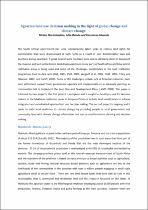 ResearchSpace
ResearchSpace
Agrarian land use decision making in the light of global change and climate change
JavaScript is disabled for your browser. Some features of this site may not work without it.
- ResearchSpace
- →
- Research Publications/Outputs
- →
- Conference Publications
- →
- View Item
| dc.contributor.author |
Murambadoro, M

|
|
| dc.contributor.author |
Mambo, J

|
|
| dc.date.accessioned | 2015-10-12T07:37:12Z | |
| dc.date.available | 2015-10-12T07:37:12Z | |
| dc.date.issued | 2014-09 | |
| dc.identifier.citation | Murambadoro, M and Mambo, J. 2014. Agrarian land use decision making in the light of global change and climate change. In: International Conference on African Agriculture, Rural Development and Sino-Africa Cooperation (CAARDSAC), Nanjing, 19-29 September 2014 | en_US |
| dc.identifier.uri | http://paepard.blogspot.co.za/2014/10/sino-african-agricultural-cooperation.html | |
| dc.identifier.uri | http://hdl.handle.net/10204/8170 | |
| dc.description | Copyright: International Conference on African Agriculture, Rural Development and Sino-Africa Cooperation (CAARDSAC), Nanjing, 19-29 September 2014. Due to copyright restrictions, the attached PDF file only contains the abstract of the full text item. For access to the full text item, please consult the publisher's website | en_US |
| dc.description.abstract | The South African government has since independence taken steps to redress land rights for communities that were dispossessed of such rights as a result of past discriminatory laws and practices during apartheid. A great deal of work has been done and is still being done to document the massive and well-orchestrated land dispossessions in many parts of South Africa and how land in restitution areas is being used and some of the challenges beneficiaries of the land restitution programme have to deal with (Hall, 2003, CSIR, 2005; Wegerif et al, 2005; CASE, 2006; Tilley and Nkazane, 2007; and Lahiff, 2008). Some of the challenges include lack of financial resources, poor post settlement support from government agencies and inappropriate or in adequate planning as communities fail to implement the Land Use and Development Plans (Lahiff, 2008). This paper is informed by two projects; the first project is complete and it sought to develop a tool for decision makers in the Makhado restitution areas in Limpopo Province to help land beneficiaries to achieve integrated and coordinated agrarian land use decision making. The second project is ongoing and it seeks to build local resilience to climate change by providing people at local government and community level with climate change information that can be used to inform planning and decision making. | en_US |
| dc.language.iso | en | en_US |
| dc.publisher | Platform for African – European Partnership in Agricultural Research for Development | en_US |
| dc.relation.ispartofseries | Workflow;14617 | |
| dc.subject | Agrarian land use | en_US |
| dc.subject | Global change | en_US |
| dc.subject | Climate change | en_US |
| dc.title | Agrarian land use decision making in the light of global change and climate change | en_US |
| dc.type | Conference Presentation | en_US |
| dc.identifier.apacitation | Murambadoro, M., & Mambo, J. (2014). Agrarian land use decision making in the light of global change and climate change. Platform for African – European Partnership in Agricultural Research for Development. http://hdl.handle.net/10204/8170 | en_ZA |
| dc.identifier.chicagocitation | Murambadoro, M, and J Mambo. "Agrarian land use decision making in the light of global change and climate change." (2014): http://hdl.handle.net/10204/8170 | en_ZA |
| dc.identifier.vancouvercitation | Murambadoro M, Mambo J, Agrarian land use decision making in the light of global change and climate change; Platform for African – European Partnership in Agricultural Research for Development; 2014. http://hdl.handle.net/10204/8170 . | en_ZA |
| dc.identifier.ris | TY - Conference Presentation AU - Murambadoro, M AU - Mambo, J AB - The South African government has since independence taken steps to redress land rights for communities that were dispossessed of such rights as a result of past discriminatory laws and practices during apartheid. A great deal of work has been done and is still being done to document the massive and well-orchestrated land dispossessions in many parts of South Africa and how land in restitution areas is being used and some of the challenges beneficiaries of the land restitution programme have to deal with (Hall, 2003, CSIR, 2005; Wegerif et al, 2005; CASE, 2006; Tilley and Nkazane, 2007; and Lahiff, 2008). Some of the challenges include lack of financial resources, poor post settlement support from government agencies and inappropriate or in adequate planning as communities fail to implement the Land Use and Development Plans (Lahiff, 2008). This paper is informed by two projects; the first project is complete and it sought to develop a tool for decision makers in the Makhado restitution areas in Limpopo Province to help land beneficiaries to achieve integrated and coordinated agrarian land use decision making. The second project is ongoing and it seeks to build local resilience to climate change by providing people at local government and community level with climate change information that can be used to inform planning and decision making. DA - 2014-09 DB - ResearchSpace DP - CSIR KW - Agrarian land use KW - Global change KW - Climate change LK - https://researchspace.csir.co.za PY - 2014 T1 - Agrarian land use decision making in the light of global change and climate change TI - Agrarian land use decision making in the light of global change and climate change UR - http://hdl.handle.net/10204/8170 ER - | en_ZA |





